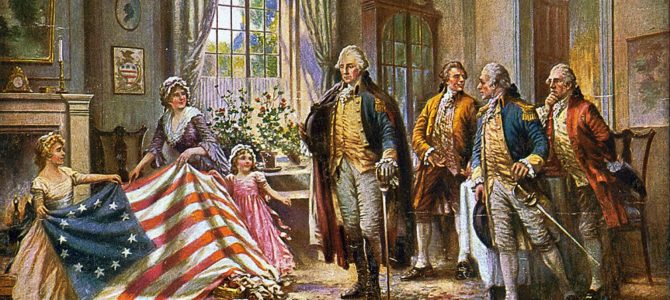
On July 4, 1776, the Declaration of Independence heralded the creation of the United States and announced “all men are created equal.” As Americans celebrate the country’s birth, a specter looms. It’s a greater danger than storm clouds to the annual barbecues and fireworks. From Virginia to California to New York to Texas, the Founders are being dismissed as hypocrites, slaveholders, and white supremacists.
Rather than vilifying the Founders based on personal faults anachronistically cast against modern sentiments of racism, sexism, and elitism, the nation needs to embrace their lofty ideology that promotes inclusiveness. The Founders were deeply flawed, but democracy and liberty are not. Let’s focus less on their failings, and more on their ideals. The Founders are for everyone, and we need them.
The Attempt to Erase the Founders Has Accelerated
During the monuments controversy, President Trump asked if people would move from vilifying Confederate statues to ones of the Founders: “Is it George Washington next week and is it Thomas Jefferson the week after?” Historians dismissed the inaccurate comparison. A day later, the pastor of Chicago’s Liberation Christian Center demanded the removal of a Washington statue in a local park because it stood for “the justice and freedom of white America.”
At both the University of Virginia and Hofstra University, Jefferson statues have been defaced with the words “racist” and “rapist.” Christ Church of Alexandria, Virginia voted to remove a plaque dedicated to its former worshipper, Washington, that made some people “feel unsafe and unwelcome.”
At George Washington University, a student compared the country’s first president and university namesake to Klu Klux Klan leader Nathan Bedford Forrest. A campaign to change the “offensive” nickname “Colonials” snowballed into a call to change the entire name of the university. Even Benjamin Franklin, president of the Pennsylvania Abolitionist Society, has drawn ire at the University of Pennsylvania (which he helped found!) because of his limited and repentant slaveholding.
The examples go on and on. A New Jersey high school principal apologized for a “Party Like It’s 1776” themed-prom, calling it “insensitive and irresponsible” since “not all communities can celebrate what life was like in 1776.” Don’t all Americans celebrate 1776 every July 4?
Dallas and San Francisco schools are investigating removing the names of Founders that did “harm to humanity,” and “engaged in slavery, female oppression or whose actions led to genocide or infringed on the right to ‘life, liberty and the pursuit of happiness.’” How can you champion 1776’s Declaration while attacking its creators and protectors?
What the Founders Did Allowed Us to Eliminate Slavery
Despite valid personal critiques, the Founders built a nation that expanded individual rights and liberties. Ever the hypocrite, Thomas Jefferson advocated equality to all in spirit, if not in practice. Franklin was one of the earliest promoters of social mobility based on merit over birth.
The anti-slavery movement was tied to revolutionary liberty, and manifested in the northern states’ early abolition of the sinful institution. Women became political and slaves gained freedom through the American Revolution. While Time portrays President Trump as a king, Washington forsook lifelong power — twice. He preserved civilian supremacy and allowed for the first successful peaceful transition of power in modern world history.
A recent documentary asked college students: “What’s the first thing that comes to mind when I say ‘George Washington’?” One student’s response: “him owning slaves.” Another believed that Washington was just “not as important” today. If this is what students think, maybe we need to study the Founders and the American Revolution more.
Despite vast recognition of diverse people’s historical contributions, some historians remain detractors. Leslie Harris’ sensationalist Washington Post op-ed denounced the George Washington Book Prize Committee and Mount Vernon of “whitewashing” history. However, Marcus Rediker previously won for “The Slave Ship,” as did Annette Gordon-Reed for a book Harris called “a substantial turning point in placing slavery at the center of the field of early American history.”
Mount Vernon, a shining example of promoting diverse history and making it publically accessible, was charged with perpetuating “insidious hierarchy,” seemingly for selecting a deserving original study of Washington’s intellectual life over Harris’ pick (a book that thanks her twice in the acknowledgments, along with Mount Vernon). Despite similar accusations, Jefferson’s Monticello opened a Sally Hemings room. Both institutions regularly seek to contextualize their slavery legacies.
Don’t Ditch the Founders, Add to Them
The creation story of the nation has diversified tremendously in recent decades. Still, at a June meeting of early American historians, the Founders’ writings were mocked as “ego documents” filled with lies, and the unity of Revolutionary ideology was ridiculed as “bullsh-t.”
The public cares about the Founders, and their ideals are accessible to all, as the success of “Hamilton” has proven. American liberty, freedom, and equality should transcend their creators’ flaws. Let’s use the term “Founders” rather than “Founding Fathers” to symbolize that people of different races and sexes helped to found the nation. But including other figures shouldn’t be at the expense of Washington, Jefferson, or Franklin.
The Founders’ ideals represent all the things we crave in today’s society, if only we would embrace them. So what’s wrong with the Founders? Personally, like everyone, quite a bit. But what’s wrong with their ideals? Nothing. All people are created equal. The Founders inspired this concept and we need to remember that, and not just on the Fourth of July.









